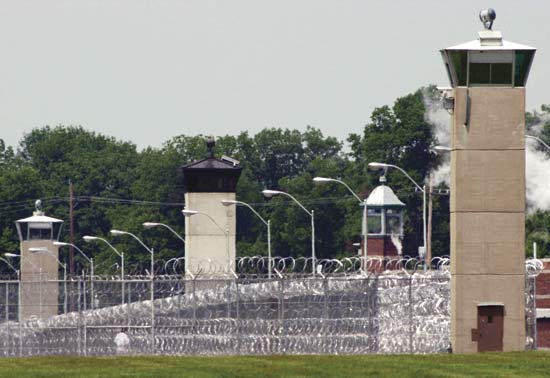How the justice system has been manipulated to put astonishing numbers of vets with PTSD and other psychiatric injuries behind bars.
By Penny Coleman, AlterNet. Posted August 12, 2009
http://www.alternet.org/world/140828/the_tragedy_of_our_%27disappeared%27_veterans/
Wayne McMahon was busted on gun charges six months after he got out of the Marines.
He was jumped by a gang of kids in his hometown of Albany, N.Y. , and he went for the assault rifle he kept in the back of his SUV.
He’s serving “three flat, with two years of post-release” at Groveland Prison in upstate New York.
Maybe it’s tempting to write McMahon off as just a screwed-up person who made the kinds of mistakes that should have landed him in jail, but maybe that’s because his injuries don’t show on the outside.
His parents were teenagers when he was born, and they separated shortly after. He bounced around on the streets of Albany, and, like so many other young Americans with dreams of escaping dysfunctional families and lousy neighborhoods, he saw the military as a get-out-of-jail-free card.
He enlisted in the Marines right out of high school.
Volunteer Army MY ASS!!!

Treatment Center for Iraqi Veterans suffering from PTSD (Post Traumatic Stress Disorder) …
Unlike physical injuries, psychiatric injuries are invisible; the burden of proof lands on the soldier (or sailor or Marine), and such injuries are easy for the public to deny.
The diagnostic criteria for post-traumatic stress disorder include a preoccupation with danger.
According to Jonathan Shay, a Veterans Administration psychiatrist and author of Achilles in Vietnam, hypervigilance in soldiers and veterans is expressed as the persistent mobilization of both body and mind to protect against lethal danger — they act as though they were still in combat, even when the danger is no longer present.
That preoccupation leads to a cluster of symptoms, including sleeplessness, exaggerated startle responses, violent outbursts and a reliance on combat skills that are inappropriate, and very often illegal, in the civilian world.
His parents were teenagers when he was born, and they separated shortly after. He bounced around on the streets of Albany, and, like so many other young Americans with dreams of escaping dysfunctional families and lousy neighborhoods, he saw the military as a get-out-of-jail-free card.
He enlisted in the Marines right out of high school.
…two days before his five-year contract was up, he was caught drinking on the job, busted down to lance corporal and administratively discharged. He lost all his benefits.
McMahon was in the Marine Corps from 2001 until 2006. He spent his last year working as an aircraft mechanic on a flight line in Afghanistan that was under near-constant attack. It was also a transshipment point for injured American soldiers who were being evacuated to Germany.
For eight months, his days and nights were spent up close and personal with the visceral evidence of what the rockets, mortars and rocket-propelled grenades do to human bodies.
Jonathan Shay also notes the almost-universal reliance on alcohol or drugs by psychically injured veterans. They afford some temporary relief from intolerable memories and from the emotional and physical exhaustion of maintaining a constant state of vigilance.
McMahon came home from Afghanistan with a serious drinking problem, a hair-trigger temper and conditioned to rely on his combat skills for survival.
Both his marriage and his military career quickly unraveled, and then he was arrested. Nobody diagnosed his PTSD until he got to Groveland.
McMahon’s obsession with safety and guns, and his compulsive drinking are both typical of a post-traumatic stress injury, but instead of diagnosis and treatment, he was left to his own compromised resources and promptly landed in jail.
In terms of the bottom line, it’s a trifecta for the military when that happens. A damaged soldier is disappeared, the cost of treatment avoided and the evidence that would prove how often veterans find it impossible to readjust when they come home is erased.
When they try to manage on their own and fail, when the entirely predictable symptoms of their injuries get them into trouble, their behavior is used to justify kicking them out of the service.
They lose all their health and disability benefits, and in the absence of treatment and support, the same behaviors that got them kicked out of the military land them in jail.
Once they enter the criminal justice system, their military service is irrelevant. Soldiers and veterans with psychiatric injuries who, like McMahon, end up in jail, are handed — and in fact often accept — the full burden of responsibility for their actions. And when that happens, the system gets off free.
Vets Demonized; the System Gets Off the Hook
Ed Hart has a hard time accepting official denial of a connection that to him seems more than obvious.
Hart is an 87-year-old Marine, a veteran of World War II. He is also a former president of Veterans for Peace, a retired attorney and a deeply concerned citizen.
“People like me are upset about what they did to us — and what they continue to do to the fuzzy-faced kids they haul off to boot camp,” Hart said. “Too many of those kids never made it back into reality; they were found guilty of terrible crimes and sent off to spend years in prison — maybe all the years left to them — and we can’t figure out what happened to them?”
Hart did in fact try to figure out what was happening in the late ‘80s, when Vietnam veterans began showing up in large numbers in the criminal justice system. Along with his pro bono legal work, he began interviewing large numbers of vets in prison.
What he discovered has been corroborated by every Bureau of Justice Statistics survey since: incarcerated veterans are better educated than their non-veteran counterparts; they are more likely to have been employed at the time of their arrest; and they are more likely to be in jail for a first offense — all of which should be factors in their favor at sentencing.
But instead, they are more likely to get longer sentences than non-veterans — on average, more than two years longer — for the same crime.
“I’ve seen prosecuting attorneys in their final statements point to the bewildered man at the defense table and tell the jury, ‘Look at him! He’s a trained killer! We need to get him off the streets and make them safe for our women and children.’ “
…dehumanization of the enemy is central to how military training enables soldiers to overcome their inherent resistance to killing other human beings.
Author Jonathan Shay describes how images of the enemy were drilled into his Vietnam-era patients as a “demonized adversary … evil, loathsome, deserving to be killed as the enemy of God, and as God-hated vermin, so inhuman as not really to care if he lives or dies.”
It seems a distortion of justice to send a man to prison for life because in the course of his military training a switch got flipped, making him temporarily more useful to his government.

🙁 what a conundrum